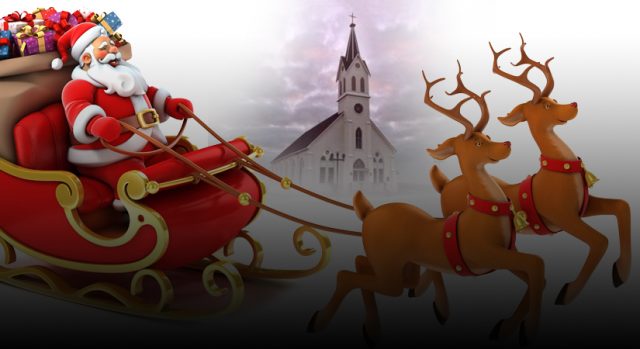The word “Christmas” itself is filled with such joy and festive spirit. As much as it is a fun-filled, joyous and gift-giving affair but, in originality, it is an annual cultural and religious festival of the Christians. We all know that Christmas is celebrated as the birth of baby Jesus. Yet, recent studies have found that it’s a pretty big misconception. Even as the non-Christians, like some of you and I, participate in this celebration, we need to keep in mind the origin of this festival. Well, it is not all about the presents and Christmas and Santa Claus.
THE PAGANS AND THE CHRISTIANS
25th December was ‘chosen’ as the commemoration of Christ’s birth. And though it may be a one-day affair here, in actuality it is a week-long fiesta. With church-masses, prayers and carols and Nativity plays, Christmas is about much more. What recent studies argue about is that 25th December was initially a pagan festival which was deliberately termed as Jesus’ birth. The Roman pagans were the very first to introduce the Holiday of Saturnalia, which was initially a week-long festival. And by ‘festival’, it means feasting and fun, but a whole different degree of fun. It was all about lawlessness lasting through a week.
The Romans pagan customs of Saturnalia included seven days of sacrifices (human sacrifices), widespread intoxication, feasting on human-shaped biscuits, free sexual license, etc. This is just a sneak-peak of what the festivities included. Later, when the Christian missionaries were in want to convert the pagans, they lured them in by stating that the pagans could keep celebrating Saturnalia as Christians. The problem of Saturnalia not being a Christian festival was solved by terming it as Jesus Christ’s Birthday. Thus, the festival was named ‘Christmas’, originating from Old English ‘Crīstesmæsse’ or “Christ’s Mass”.
Though many of the initial customs do continue, but only in a more decent and moderate manner. For example, there is still the mood of merrymaking, feasting and drinking wine. Also, the door-to-door sexual indulgence has been replaced by caroling. The human sacrifice custom may be eradicated, yet the turkey feast continues. To make it more religious, we have the midnight mass, plays, prayers, etc.
SANTA OR SAINT?
Surely not many of us knew about this baffling history of Christmas. What we celebrate as a festival of giving, was originally a bloody and chaotic pagan gala time. So, in reality, 25th December is nothing related to Christ’s birth and the same goes for our favorite Santa Claus. Santa evolved from the famous Greek Christian Bishop of Myra- St. Nicholas. He was known for his kindness and helping the needy, especially the children.
With time, the figure of Father Christmas along with various poems converted this figure into what now we call as ‘Santa Claus’. Father Christmas was associated with the Christmas cheer and spirit who brought along with him these happy feelings. In the Dutch and Belgian folklore, the image of ‘Sinter Klaas’ was associated with gift giving. Thus, a juxtaposition of all these figures resulted in our modern day Santa.
CHRISTMAS IN INDIA
It is no rocket-science to determine the history of celebrating Christmas in India. With the incoming of British Rule, there was an inflow of culture and traditions too. India remained colonized until 1947 and even now we are not completely decolonized. Thus, some of those cultures and customs remained in India. Though Christianity might be a minority religion in India, yet this day is celebrated in every nook and corner. Maybe the whole custom is not followed but, the gift-giving, decorating and the Christmas cheer is followed step-by-step.
The real fiesta of Christmas can be seen in southern-India. Mainly in areas like Kerala, Tamil Nadu, Goa, etc, where they follow the tradition heartily. The Christmas tree is adorned, prayers are offered, the mesmerizing carol music can be heard, the houses decorated and the delicious, mouth-watering delicacies along with the much-awaited Christmas pudding- this is what Christmas in India is.
India is known for its diversity and what other occasion than festivals to be an epitome of ‘Unity in Diversity’.
It is an eye-opening history behind Christmas and its traditions. This fest was never about the feeling of giving and love, rather it was a whole different case of indulgence in lawlessness, torture and gore. Yet, as with time, traditions and customs change and get replaced, the spirit of Christmas too has undergone a massive change. And thankfully now, it is being used for all the right purposes. Let this ideal festive spirit of Christmas make you do some good for others as well. Be your own Santa or become someone’s Santa and present the joy and love of this fest to the indigent.






























































